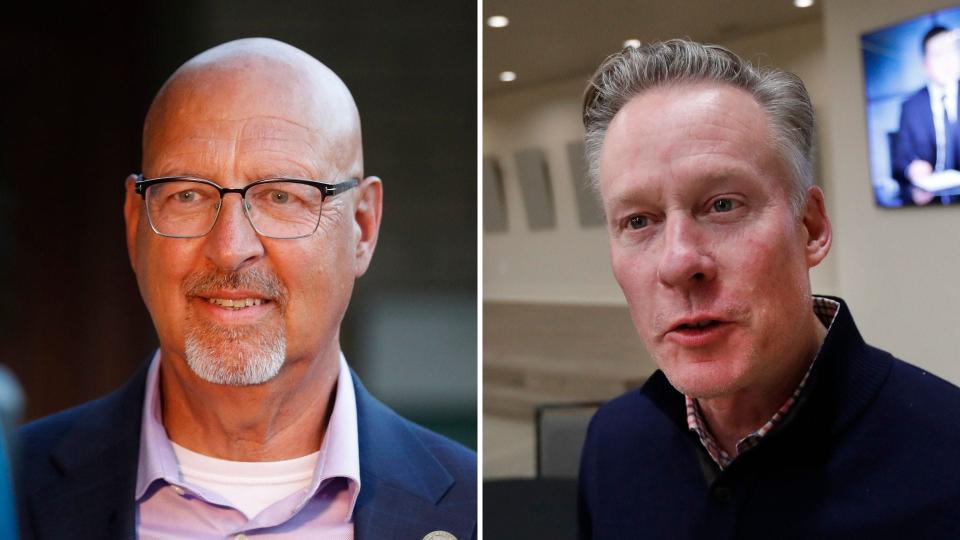Drew Landry: Lubbock voters went with the 'smart, safe bet' in municipal election
- Oops!Something went wrong.Please try again later.
“Meet the new boss, same as the old boss” is the final, classic line from The Who’s “Won’t Get Fooled Again” counterculture rock hit. That line correctly describes the results from last Saturday's election.
The smart, safe bet on the mayoral race was a runoff between Councilmen Steve Massengale and Mark McBrayer. This is because they would split the largely consistent, conservative vote in the city. That is exactly what happened with McBrayer finishing in first with 37.4% and Massengale in second with 28.2% of the vote.
More: McBrayer, Massengale will head to runoff for Lubbock mayor

It is worth mentioning over 30,000 Lubbockites turned out to vote in this mayor’s race, which is the largest turnout in recent elections for this race. It was widely reported the early vote totals in this city-wide election surpassed the total vote in the last several municipal elections. That is quite the accomplishment.
That large turnout was – without question – due to Proposition A. The movement to decriminalize relatively small amounts of marijuana within the city limits propelled activity from locally elected officials to political action committees (PACs). Project Destiny and Freedom Act Lubbock were the two major PACs that emerged on opposing sides of the issue. Project Destiny, which has D.C.-connected political operatives aiding its efforts and was embarrassingly and glaringly late in a campaign finance report to the Texas Ethics Commission (TEC), has connections to people with deep pockets. In the PAC’s eight-day pre-election campaign finance report to the TEC, it boasted $138,204 worth of fundraising and spent $106,804.42 with roughly $72,000 in its account. The PAC’s largest single donation from a person was $50,000.
Where Project Destiny had its money and tremendous fundraising capabilities, Freedom Act Lubbock focused on a grassroots effort. In all honesty, it had no other option. In its eight-day pre-election campaign finance report to the city, Freedom Act Lubbock was able to fundraise $1,463. Its consistent boots-on-the-ground brand of retail politics, which is an effective campaign tactic, was outmatched by the big-spending, deeply connected competitor. The election results proved that.
But on analysis, Freedom Act Lubbock was able to achieve something Project Destiny did not. Prop A – started by Freedom Act Lubbock – raised the turnout in a mayoral election. It should also be known that Project Destiny did not make any endorsements in the race for Lubbock’s Mayor. While Freedom Act Lubbock did not either, Adam Hernandez’s mayoral campaign hitched itself to Freedom Act Lubbock. The Hernandez campaign’s hope hindered on the higher-than-usual voter turnout to not only support Prop A, but also his candidacy. That unfortunately did not happen. In the Prop A vote, 11,242 supported it. In the mayoral race, Adam Hernandez got a little more than half of the Prop A vote, equaling 6,307. This means that there were some Prop A supporters who voted for other mayoral candidates. Had Hernandez received 80% of the vote from those Prop A supporters, he would – probably – replace Councilman Massengale in the runoff.
To be clear, Prop A was the wildcard in the aforementioned safe bet. Had 10-15,000 more Lubbockites participated in this election, the results could have been different. Furthermore, had the same groups that supported making Lubbock a “wet” city in 2009 thrown their support behind Prop A, maybe a different result would have happened. There are a lot of “what ifs” here, but what is true is twofold.
One is voter turnout. While Lubbock had a historic turnout in the mayoral election and that is to be celebrated, only 20% of registered voters in the city accounted for the turnout. Had more voters from the north, east, northeastern, and Tech Terrace areas of the city participated, there is little question the results would have changed. Since they did not, voters from the south, west, and southwestern portions of the city decided – yet again – who runs Lubbock’s government. Until more Lubbockites view real change through elections, voter apathy and the dismal turnouts it causes will continue.
The other truth surrounds the narrative of Lubbock being a conservative city. A majority of the political activists in The Hub City are, for sure. And those who consistently vote tend to support conservative candidates. But that does not make Lubbock a conservative city. In the past 40 years, how many bond elections in the city failed? One might count them on one hand. Is it conservative to be against public education? Is the local teen birth rate being 81% higher than the U.S. rate and 21% higher than the Texas rate a conservative value? Is Lubbock being a “wet” city a conservative value?
The aforementioned argues the point Lubbock’s conservatism is to be taken at face value. Until the voter turnout increases to roughly 40% can we truly make such a judgment. Voter turnout will rely on a few factors – and the timing of elections is one of them by the way. Move the municipal elections to November – and an exciting issue on the ballot is one of them. What Freedom Act Lubbock found out was it rattled the cage and roughly the same people who supported the Sanctuary City for the Unborn ordinance opposed Prop A.
At the end of the day, a mayoral runoff will happen in mid-June. The winner from that will lead the city for the next two years. The one who can court a majority of the 6,307 people who supported Adam Hernandez could very well walk away as the winner.
Drew Landry is an assistant professor of government at South Plains College.
This article originally appeared on Lubbock Avalanche-Journal: Landry: Lubbock voters went with 'smart, safe bet' in municipal election

